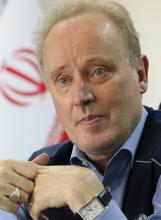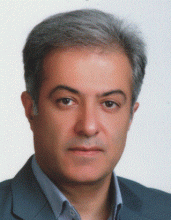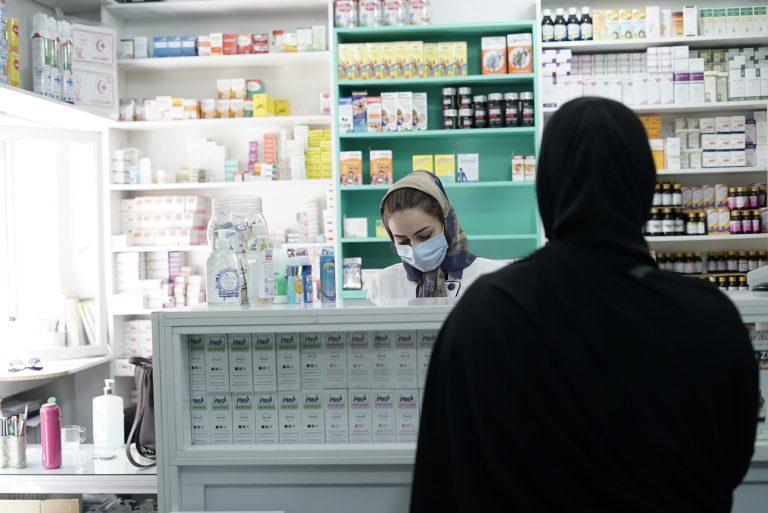The Islamic Republic of Iran is responding to the COVID-19 crisis through strengthening primary health care (PHC) as a foundation of universal health coverage. This is done through an initiative called “Each home one health post” which is striving to empower families and communities to protect their health. In addition, the Islamic Republic of Iran, as with some other countries in the region, is piloting its PHC Measurement and Improvement Programme.
A strong network of PHC centres and community health workers serve as the first point of contact for communities, strengthening their role in national efforts to prevent, detect and treat cases of COVID-19.
Through the PHC initiative, the Islamic Republic of Iran’s population is able to access COVID-19 information, treatment, care and follow-up. People understand better how to protect themselves and what to do if they feel ill, contributing to a more effective emergency response.
The Islamic Republic of Iran’s Ministry of Health and Medical Education is working with WHO and other partners to assess, analyze and implement changes to strengthen the PHC system to better respond to COVID-19.

“The initiative [Each home one health post] was originally aimed at systematically strengthening primary health care in terms of disease prevention and health promotion. Now, it has become vital to further expand primary health care capacity in the fight against the coronavirus. Early case detection, contact tracing and home isolation need practical knowledge, and this initiative directly helps families during the time of COVID-19. WHO is working with the government to roll out this programme for the whole country.”

"The Primary Health Care Measurement and Improvement Programme” [an initiative of WHO] has helped us identify the PHC gaps for hand hygiene and professional management. In this regard, we have improved the WASH [water, sanitation and hygiene] related facilities from 50% to above 90% for the whole country. Additionally, the professional management trainings that we have conducted so far, have assisted our PHC facility managers to better combat the [COVID-19] crisis and better manage and strengthen their human resources.”
THE LONG READ
“Each home one health post” is an initiative that was launched in the Islamic Republic of Iran’s primary health care (PHC) facilities well before COVID-19 struck the country. Bringing health and care directly to the home environment is at the heart of building healthy communities and populations. Indeed, in the era of COVID-19 and with the Islamic Republic of Iran stretching its capacity to contain the virus, the ethos and practice of the initiative has helped save many lives.
“The initiative was originally aimed at systematically strengthening primary health care in terms of disease prevention and health promotion. Now, it has become vital to further expand primary health care capacity in the fight against the coronavirus. Early case detection, contact tracing and home isolation need practical knowledge, and this initiative directly helps families during the time of COVID-19. WHO is working with the government to roll out this programme for the whole country,” said Dr Christoph Hamelmann, WHO Representative in the Islamic Republic of Iran.

COVID-19 – a serious threat in the Islamic Republic of Iran
The Islamic Republic of Iran was one of the first countries in the world to experience a rapid progression of COVID-19, which then affected much of the country. Two initial cases were reported on 19 February 2020, both of which were fatal. The first peak came at the end of March, with around 3,200 confirmed cases a day, resulting in a very challenging situation for the population and authorities.
In addition to the burnout and fatigue experienced by the health workforce since the outbreak started, many have also been infected.
Similar to the experiences of other countries, the spread of the disease had serious implications to the health system. Although a strong PHC system was in place, the Islamic Republic of Iran lacked personal protective equipment as well as hospital and laboratory equipment as a result of the global supply shortage due to the rapid and high demand exacerbated by short delivery timeframes. Sanction-related restrictions on international transfer of payments in the Islamic Republic of Iran’s banking system adds to this challenge.
The already fragile economic situation of the Islamic Republic of Iran directly affects the health sector and well-being of the population. This is now compounded by the impacts of COVID-19. The role of PHC has proven critical for early case detection, contact tracing, triage and referal to hospitals.

A unique heath system
The Islamic Republic of Iran’s health system has a unique structure. Established after the 1979 revolution, it combines the mandates of the Ministry of Health and Medical Education, and also provides medical education, research and health policy under the same umbrella.
Before COVID-19, the Islamic Republic of Iran had developed a hospital emergency preparedness plan and strengthened its International Health Regulations core capacity for preparedness to respond to public health emergencies with a focus on laboratories, legislation and points of entry. This effort to strengthen emergency preparedness and health security helped lay the foundation for protecting the country from future health threats.
Across the Islamic Republic of Iran, more than 60 medical universities with a high level of specialist knowledge and expertise have provided a solid platform for building upon the concept of resilient health systems during the COVID-19 epidemic. The leadership of the Ministry of Health, in coordination with other national sectors and WHO, has also led to a “health in all policies” approach to policy implementation in the Islamic Republic of Iran.
Using primary health care to respond to COVID-19
With a strong understanding of the vital role of communities and local engagement with health, the Islamic Republic of Iran designed its national COVID-19 response around its well-established PHC system.
The national flagship PHC programme in the Islamic Republic of Iran is called “Each home one health post’. It was initiated by the Minister of Health and started shortly before the COVID-19 pandemic. It is now being rolled out as a major component to raise population awareness on keeping safe from COVID-19 and to improve the population’s access to services, with particular focus on people who are most at risk.
PHC performance is also being measured and analyzed to consistently improve outcomes by identifying strengths and addressing weaknesses as well as gaps.
“The Primary Health Care Measurement and Improvement Programme” [an initiative of WHO] has helped us identify the PHC gaps for hand hygiene and professional management. In this regard, we have improved the WASH [water, sanitation and hygiene] related facilities from 50% to above 90% for the whole country. Additionally, the professional management trainings that we have conducted so far, have assisted our PHC facility managers to better combat the [COVID-19] crisis and better manage and strengthen their human resources,” said Dr Jafar Sadegh Tabrizi, Director General for PHC Network Management at the Islamic Republic of Iran’s Ministry of Health and Medical Education.

Dr Mohammad Bakhtiari, a researcher at the Parliamentary Research Centre in the Islamic Republic of Iran, believes that during emergencies, hospitals have always been considered as the first point of contact. He highlights the the role of PHC in health emergencies, especially during the COVID-19 outbreak, in helping to look after people who live close to the PHC facilities, which also reduces overcrowding in hospitals.
“I am very optimistic about the “Each home one health post” project. I think it can help the PHC facilities to be strengthened and play a key role in health emergencies and outbreak of diseases,” he said.
Across the Islamic Republic of Iran, comprehensive health centres provide the first point of care for people. This PHC network in urban and rural areas has provided essential health services and a strong response to COVID-19 using triage to reduce the load and burden on hospitals. A self-assessment portal, a national mobilization campaign and hotline built on electronic-health records in the PHC system, are helping identify and trace suspected cases. The PHC facilities own a complete registry including demographic records and disease histories of the citizens in their areas. This provides information on vulnerable groups, including people in age groups who risk developing moderate-to-severe COVID-19 symptoms and who may need hospital care. When a certain threshold of answers is reached, an automatic text message sends, inviting patients to get tested at their nearest PHC facility.
PHC staff follow up on suspected cases in the communities by phone on a routine basis, including the most vulnerable people. All PHC workers follow national protocols on home care, including midwives and community health workers who provide remote care and counselling to pregnant mothers.
Patients who physically visit the PHC centres for COVID-19 services are able to see a physician who advises on referral to hospital, medication or home isolation and care. Follow-up is also conducted by phone for patients who are not referred to hospitals in order to track their disease symptoms. As a result of implementing the initiative, hand-hygiene and waste disposal-related infrastructure has also improved.

COUNTRY RESOURCES
Islamic Republic of Iran Country Office COVID-19 Daily Updates Archive (English) (French)
WATCH: Each home one health post
WHO support to strengthen primary health care
The UHC Partnership has been supporting the WHO country office in the Islamic Republic of Iran since early 2020 to build on or scale up ongoing priority activities that need more resources. It has assisted the Ministry of Health and Medical Education in piloting and scaling up a PHC measurement and improvement model, which identifies areas requiring support for a more efficient and effective response to COVID-19.
The UHC Partnership assists 115 countries in accelerating progress to achieve UHC through funding provided by the European Union (EU), the Grand Duchy of Luxembourg, Irish Aid, the Government of Japan, the French Ministry for Europe and Foreign Affairs, the United Kingdom – Foreign, Commonwealth & Development Office and Belgium.
PHC facilities have taken many steps to improve health literacy and health promotion by developing training packages, conducting virtual training and by engaging the public. One example is the “#we-will-overcome-corona” campaign, which enhances health literacy by helping people improve their hygiene and look out and react to signs and symptoms for early detection of COVID-19 and personal protection.
WHO has also supported the Islamic Republic of Iran in enhancing logistical capacities to distribute all required personal protective equipment, essential medications and supplies.
A nationwide satisfaction assessment approach generates feedback directly from patients via SMS after they receive care at PHC centre. This is expected to result in a better-informed, more patient-centred response to COVID-19.
The COVID-19 outbreak and current economic situation led the Ministry to increase the efficiency of the health system and to reduce costs and wastage. The UHC Partnership, in collaboration with Radboud University and the Medical Center in the Netherlands, also carried out a consultation to use an evidence-based process to develop a “UHC health insurance benefit package” that would expand coverage and enhance the population’s access to quality health care without leading them to experience financial hardship. This process is used for rational, transparent, and fair decisions on the public reimbursement of health interventions.

Health at home
With all of the challenges the Islamic Republic of Iran and most countries face in addressing COVID-19, its response using a strong PHC approach is bringing services closer to communities and families, using locally-driven information, care and protection. The Islamic Republic of Iran’s experience demonstrates that a well-functioning, resilient health system based on PHC is the bedrock for progress towards the interrelated goals of UHC and health security.
